Nursing Assignment: Reflection on Dementia Caregiver Experiences
VerifiedAdded on 2022/09/29
|5
|1032
|20
Homework Assignment
AI Summary
This nursing assignment reflects on the experiences of family caregivers of patients with early-onset dementia. The student analyzes a research article discussing the challenges faced by caregivers, including loss of freedom, emotional distress, and the burden of managing patients' behavioral changes. The assignment connects the caregivers' experiences with the student's own understanding as a nursing student, highlighting the complex symptoms of dementia and the need for healthcare professionals to support caregivers through education and tailored strategies. The student emphasizes the importance of educating family members about the disease progression and ways to cope with behavioral changes, concluding with a plan to engage in continuing professional education to improve family education and coping strategies. The assignment uses relevant research articles to support the analysis and reflection.
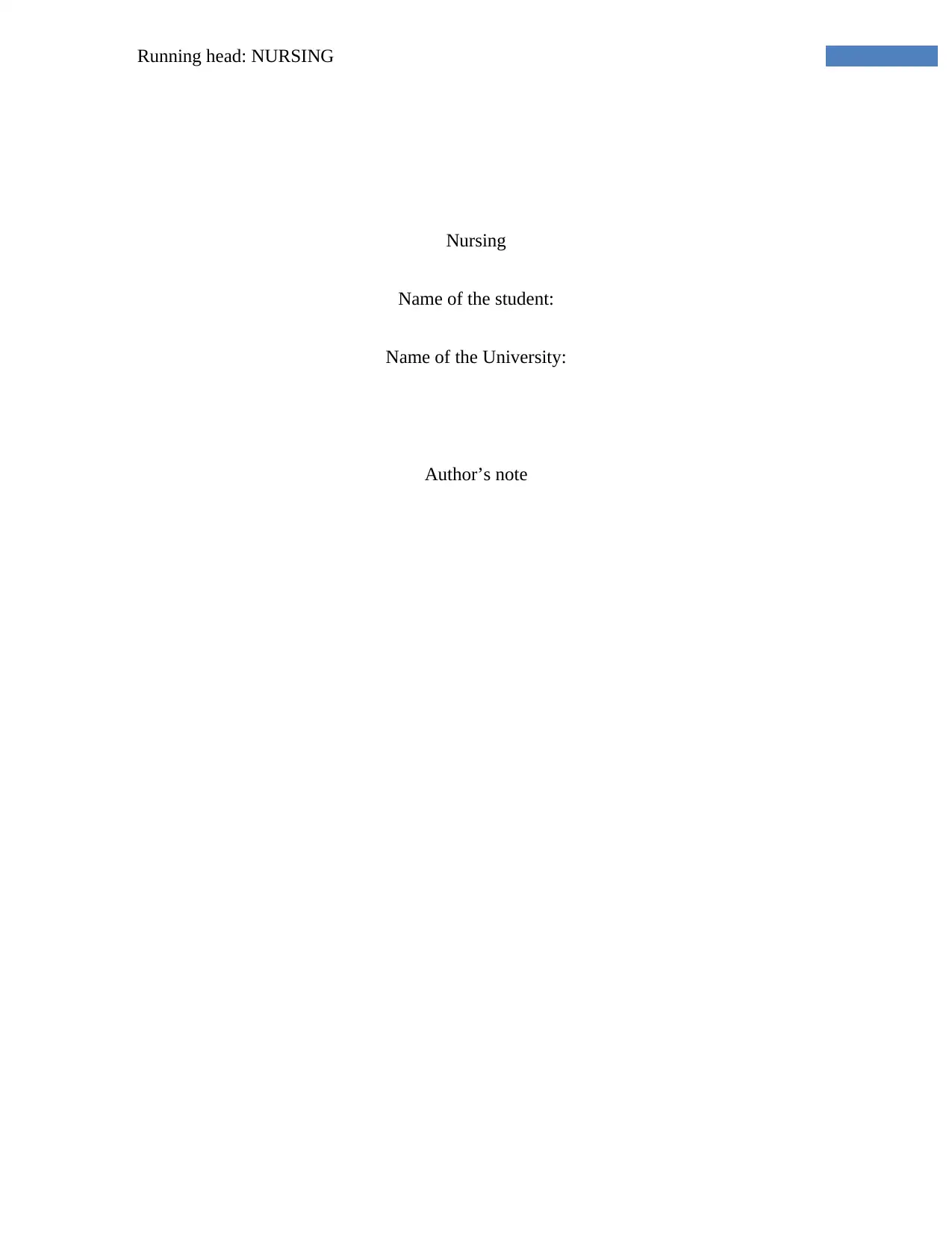
Running head: NURSING
Nursing
Name of the student:
Name of the University:
Author’s note
Nursing
Name of the student:
Name of the University:
Author’s note
Paraphrase This Document
Need a fresh take? Get an instant paraphrase of this document with our AI Paraphraser
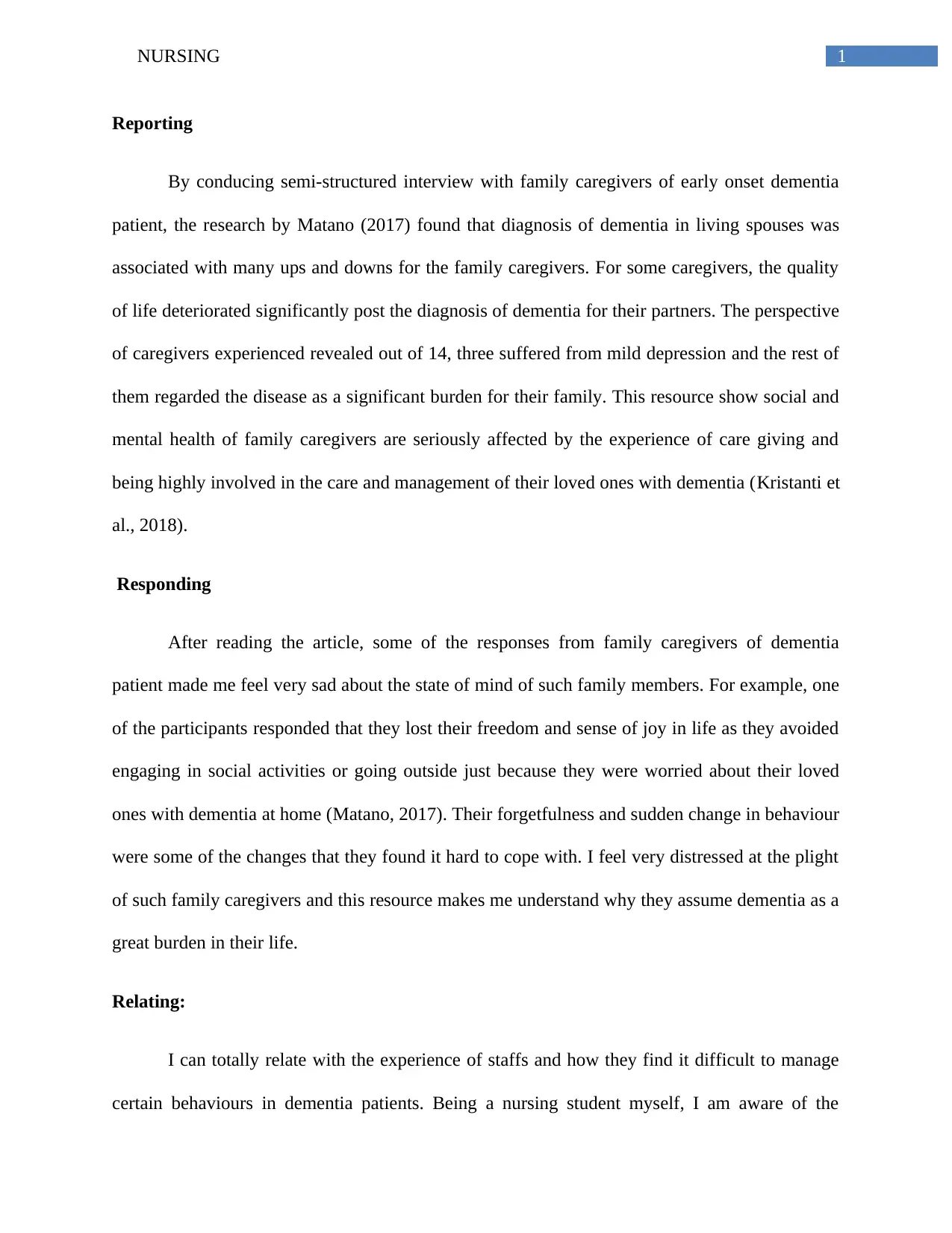
1NURSING
Reporting
By conducing semi-structured interview with family caregivers of early onset dementia
patient, the research by Matano (2017) found that diagnosis of dementia in living spouses was
associated with many ups and downs for the family caregivers. For some caregivers, the quality
of life deteriorated significantly post the diagnosis of dementia for their partners. The perspective
of caregivers experienced revealed out of 14, three suffered from mild depression and the rest of
them regarded the disease as a significant burden for their family. This resource show social and
mental health of family caregivers are seriously affected by the experience of care giving and
being highly involved in the care and management of their loved ones with dementia (Kristanti et
al., 2018).
Responding
After reading the article, some of the responses from family caregivers of dementia
patient made me feel very sad about the state of mind of such family members. For example, one
of the participants responded that they lost their freedom and sense of joy in life as they avoided
engaging in social activities or going outside just because they were worried about their loved
ones with dementia at home (Matano, 2017). Their forgetfulness and sudden change in behaviour
were some of the changes that they found it hard to cope with. I feel very distressed at the plight
of such family caregivers and this resource makes me understand why they assume dementia as a
great burden in their life.
Relating:
I can totally relate with the experience of staffs and how they find it difficult to manage
certain behaviours in dementia patients. Being a nursing student myself, I am aware of the
Reporting
By conducing semi-structured interview with family caregivers of early onset dementia
patient, the research by Matano (2017) found that diagnosis of dementia in living spouses was
associated with many ups and downs for the family caregivers. For some caregivers, the quality
of life deteriorated significantly post the diagnosis of dementia for their partners. The perspective
of caregivers experienced revealed out of 14, three suffered from mild depression and the rest of
them regarded the disease as a significant burden for their family. This resource show social and
mental health of family caregivers are seriously affected by the experience of care giving and
being highly involved in the care and management of their loved ones with dementia (Kristanti et
al., 2018).
Responding
After reading the article, some of the responses from family caregivers of dementia
patient made me feel very sad about the state of mind of such family members. For example, one
of the participants responded that they lost their freedom and sense of joy in life as they avoided
engaging in social activities or going outside just because they were worried about their loved
ones with dementia at home (Matano, 2017). Their forgetfulness and sudden change in behaviour
were some of the changes that they found it hard to cope with. I feel very distressed at the plight
of such family caregivers and this resource makes me understand why they assume dementia as a
great burden in their life.
Relating:
I can totally relate with the experience of staffs and how they find it difficult to manage
certain behaviours in dementia patients. Being a nursing student myself, I am aware of the
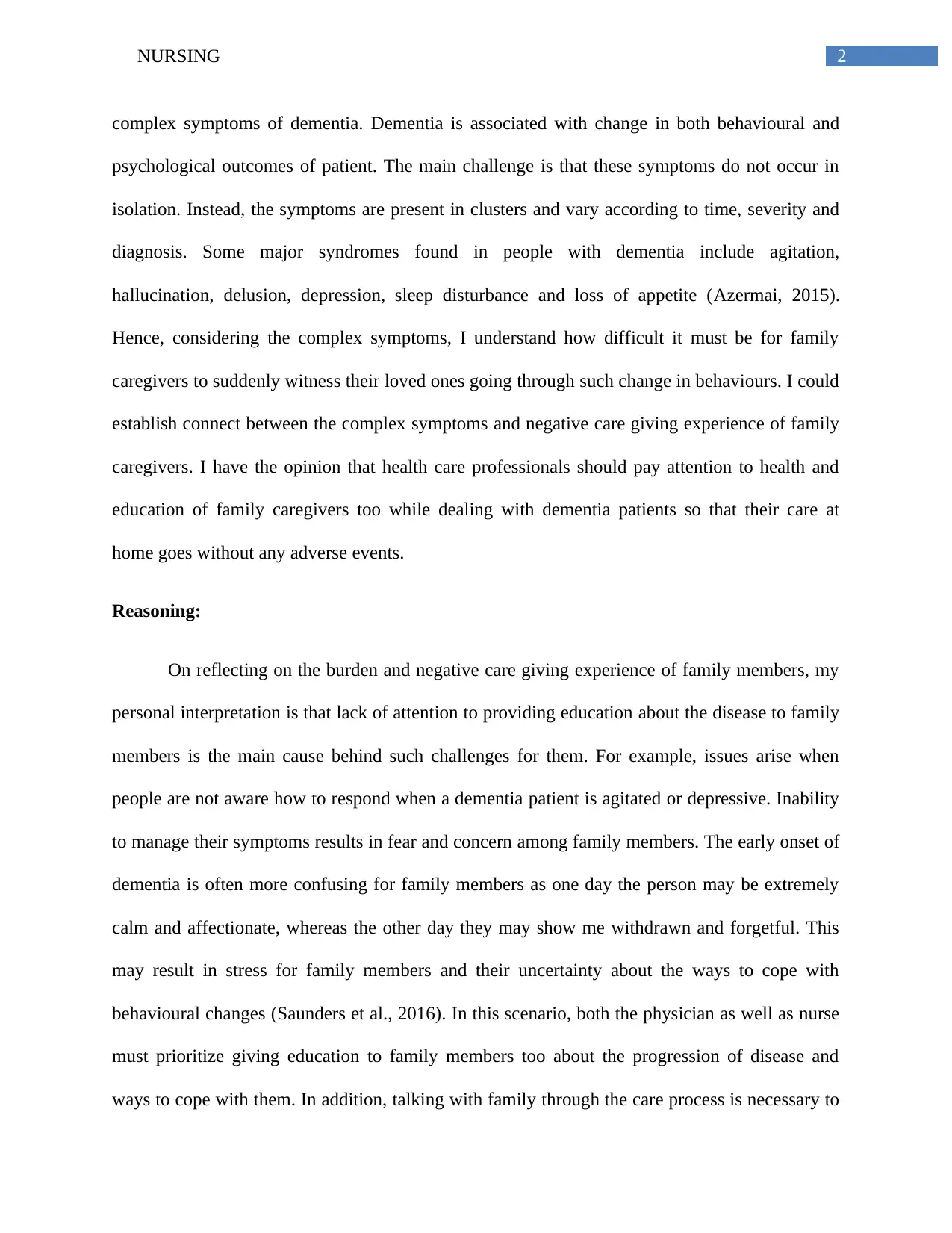
2NURSING
complex symptoms of dementia. Dementia is associated with change in both behavioural and
psychological outcomes of patient. The main challenge is that these symptoms do not occur in
isolation. Instead, the symptoms are present in clusters and vary according to time, severity and
diagnosis. Some major syndromes found in people with dementia include agitation,
hallucination, delusion, depression, sleep disturbance and loss of appetite (Azermai, 2015).
Hence, considering the complex symptoms, I understand how difficult it must be for family
caregivers to suddenly witness their loved ones going through such change in behaviours. I could
establish connect between the complex symptoms and negative care giving experience of family
caregivers. I have the opinion that health care professionals should pay attention to health and
education of family caregivers too while dealing with dementia patients so that their care at
home goes without any adverse events.
Reasoning:
On reflecting on the burden and negative care giving experience of family members, my
personal interpretation is that lack of attention to providing education about the disease to family
members is the main cause behind such challenges for them. For example, issues arise when
people are not aware how to respond when a dementia patient is agitated or depressive. Inability
to manage their symptoms results in fear and concern among family members. The early onset of
dementia is often more confusing for family members as one day the person may be extremely
calm and affectionate, whereas the other day they may show me withdrawn and forgetful. This
may result in stress for family members and their uncertainty about the ways to cope with
behavioural changes (Saunders et al., 2016). In this scenario, both the physician as well as nurse
must prioritize giving education to family members too about the progression of disease and
ways to cope with them. In addition, talking with family through the care process is necessary to
complex symptoms of dementia. Dementia is associated with change in both behavioural and
psychological outcomes of patient. The main challenge is that these symptoms do not occur in
isolation. Instead, the symptoms are present in clusters and vary according to time, severity and
diagnosis. Some major syndromes found in people with dementia include agitation,
hallucination, delusion, depression, sleep disturbance and loss of appetite (Azermai, 2015).
Hence, considering the complex symptoms, I understand how difficult it must be for family
caregivers to suddenly witness their loved ones going through such change in behaviours. I could
establish connect between the complex symptoms and negative care giving experience of family
caregivers. I have the opinion that health care professionals should pay attention to health and
education of family caregivers too while dealing with dementia patients so that their care at
home goes without any adverse events.
Reasoning:
On reflecting on the burden and negative care giving experience of family members, my
personal interpretation is that lack of attention to providing education about the disease to family
members is the main cause behind such challenges for them. For example, issues arise when
people are not aware how to respond when a dementia patient is agitated or depressive. Inability
to manage their symptoms results in fear and concern among family members. The early onset of
dementia is often more confusing for family members as one day the person may be extremely
calm and affectionate, whereas the other day they may show me withdrawn and forgetful. This
may result in stress for family members and their uncertainty about the ways to cope with
behavioural changes (Saunders et al., 2016). In this scenario, both the physician as well as nurse
must prioritize giving education to family members too about the progression of disease and
ways to cope with them. In addition, talking with family through the care process is necessary to
⊘ This is a preview!⊘
Do you want full access?
Subscribe today to unlock all pages.

Trusted by 1+ million students worldwide
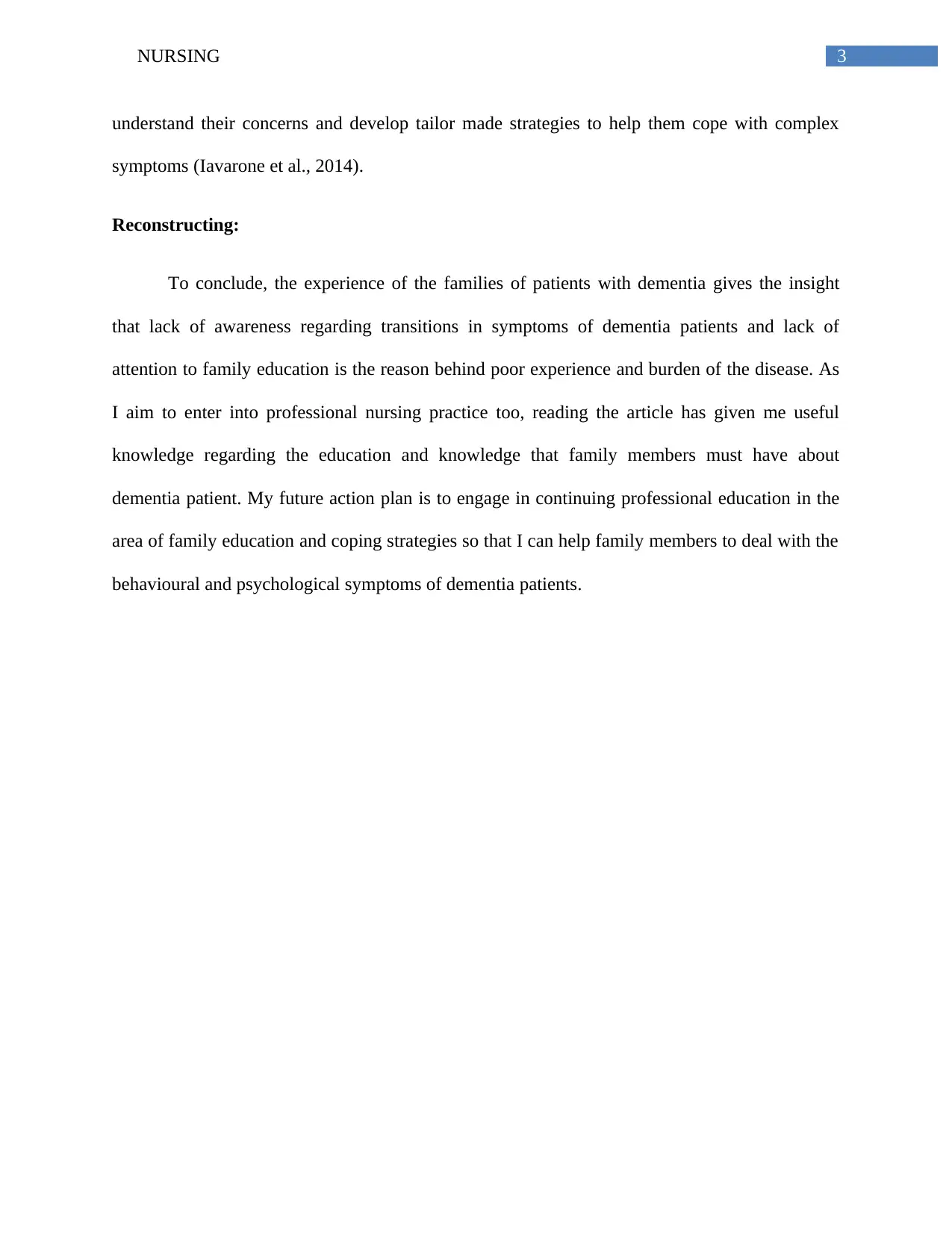
3NURSING
understand their concerns and develop tailor made strategies to help them cope with complex
symptoms (Iavarone et al., 2014).
Reconstructing:
To conclude, the experience of the families of patients with dementia gives the insight
that lack of awareness regarding transitions in symptoms of dementia patients and lack of
attention to family education is the reason behind poor experience and burden of the disease. As
I aim to enter into professional nursing practice too, reading the article has given me useful
knowledge regarding the education and knowledge that family members must have about
dementia patient. My future action plan is to engage in continuing professional education in the
area of family education and coping strategies so that I can help family members to deal with the
behavioural and psychological symptoms of dementia patients.
understand their concerns and develop tailor made strategies to help them cope with complex
symptoms (Iavarone et al., 2014).
Reconstructing:
To conclude, the experience of the families of patients with dementia gives the insight
that lack of awareness regarding transitions in symptoms of dementia patients and lack of
attention to family education is the reason behind poor experience and burden of the disease. As
I aim to enter into professional nursing practice too, reading the article has given me useful
knowledge regarding the education and knowledge that family members must have about
dementia patient. My future action plan is to engage in continuing professional education in the
area of family education and coping strategies so that I can help family members to deal with the
behavioural and psychological symptoms of dementia patients.
Paraphrase This Document
Need a fresh take? Get an instant paraphrase of this document with our AI Paraphraser
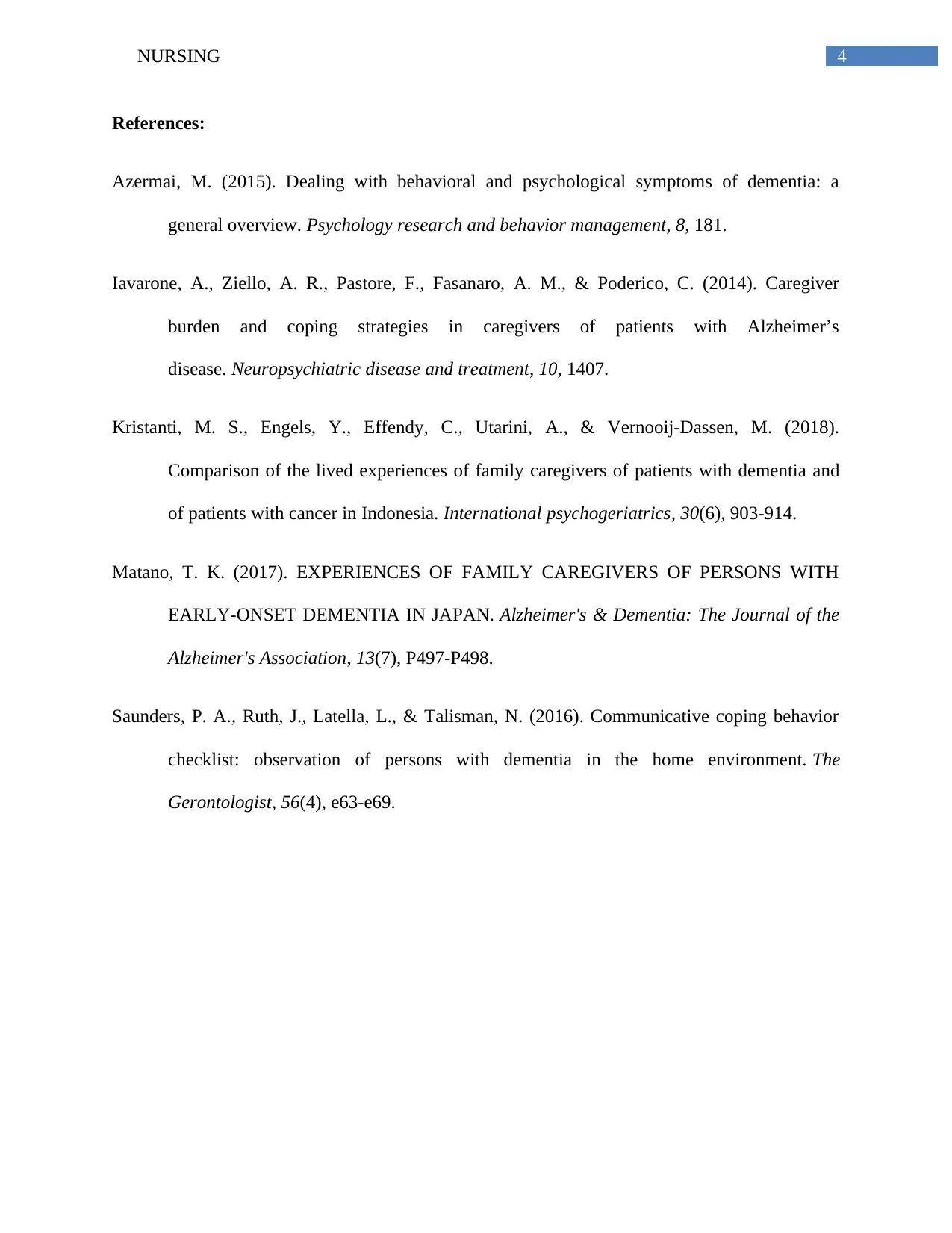
4NURSING
References:
Azermai, M. (2015). Dealing with behavioral and psychological symptoms of dementia: a
general overview. Psychology research and behavior management, 8, 181.
Iavarone, A., Ziello, A. R., Pastore, F., Fasanaro, A. M., & Poderico, C. (2014). Caregiver
burden and coping strategies in caregivers of patients with Alzheimer’s
disease. Neuropsychiatric disease and treatment, 10, 1407.
Kristanti, M. S., Engels, Y., Effendy, C., Utarini, A., & Vernooij-Dassen, M. (2018).
Comparison of the lived experiences of family caregivers of patients with dementia and
of patients with cancer in Indonesia. International psychogeriatrics, 30(6), 903-914.
Matano, T. K. (2017). EXPERIENCES OF FAMILY CAREGIVERS OF PERSONS WITH
EARLY-ONSET DEMENTIA IN JAPAN. Alzheimer's & Dementia: The Journal of the
Alzheimer's Association, 13(7), P497-P498.
Saunders, P. A., Ruth, J., Latella, L., & Talisman, N. (2016). Communicative coping behavior
checklist: observation of persons with dementia in the home environment. The
Gerontologist, 56(4), e63-e69.
References:
Azermai, M. (2015). Dealing with behavioral and psychological symptoms of dementia: a
general overview. Psychology research and behavior management, 8, 181.
Iavarone, A., Ziello, A. R., Pastore, F., Fasanaro, A. M., & Poderico, C. (2014). Caregiver
burden and coping strategies in caregivers of patients with Alzheimer’s
disease. Neuropsychiatric disease and treatment, 10, 1407.
Kristanti, M. S., Engels, Y., Effendy, C., Utarini, A., & Vernooij-Dassen, M. (2018).
Comparison of the lived experiences of family caregivers of patients with dementia and
of patients with cancer in Indonesia. International psychogeriatrics, 30(6), 903-914.
Matano, T. K. (2017). EXPERIENCES OF FAMILY CAREGIVERS OF PERSONS WITH
EARLY-ONSET DEMENTIA IN JAPAN. Alzheimer's & Dementia: The Journal of the
Alzheimer's Association, 13(7), P497-P498.
Saunders, P. A., Ruth, J., Latella, L., & Talisman, N. (2016). Communicative coping behavior
checklist: observation of persons with dementia in the home environment. The
Gerontologist, 56(4), e63-e69.
1 out of 5
Related Documents
Your All-in-One AI-Powered Toolkit for Academic Success.
+13062052269
info@desklib.com
Available 24*7 on WhatsApp / Email
![[object Object]](/_next/static/media/star-bottom.7253800d.svg)
Unlock your academic potential
Copyright © 2020–2026 A2Z Services. All Rights Reserved. Developed and managed by ZUCOL.





